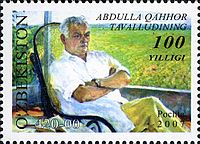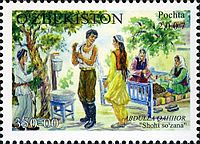| Revision as of 21:39, 17 August 2024 editNataev (talk | contribs)Autopatrolled, Extended confirmed users10,107 edits State Hamza Prize year← Previous edit | Revision as of 21:52, 17 August 2024 edit undoNataev (talk | contribs)Autopatrolled, Extended confirmed users10,107 edits →Life: expanded the sectionTag: harv-errorNext edit → | ||
| Line 20: | Line 20: | ||
| ==Life== | ==Life== | ||
| Abdulla Qahhor was born on 17 September 1907 in ].{{sfn|Abdumavlyanov|1966|p=181}}{{efn|name=birthplace|Some sources claim that he was born in what is now the ] of ].{{sfn|Sodiq|2006|p=140}}}} According to some sources, his father was a ].<ref>{{cite book|title=Писатели советского Узбекистана|trans-title=Writers of Soviet Uzbekistan|publisher=Государственное издательство художественной литературы УзССР.|year=1959|language=ru|pages=83-85}}</ref> According to other sources, his father was a shoemaker,<ref name="SAKh">{{cite book|title=Совет адабиёти: хрестоматия: ўрта мактабнинг мактабнинг 10-синфи учун|trans-title=Soviet Literature: Chrestomathy: For the 10th Frade of Secondary School|publisher=O‘zSSR davlat o‘quv-pedagogika nashriyoti|year=1955|language=uz|page=557|url=https://books.google.com/books?id=1rjhAAAAMAAJ}}</ref> or, alternatively, his family were farmers.<ref>{{cite book|title=Абдулла Қаҳҳор|date=1957|volume=1|publisher=UzSSR davlat badiiy adabiyot nashriyoti}}</ref> | |||
| Abdulla Qahhor was born on September 17, 1907, in ]. His father was a ] and moved from place to place for work. Qahhor attended several schools in Kokand and other nearby villages. From 1922 to 1924, he attended a ] in Kokand which specialized in training school teachers. In 1926, Qahhor completed a university preparatory program at Samarkand State University. In 1930, he graduated from Central Asian State University with a degree in ]. From 1933 to 1935, Qahhor was a graduate student at the Institute of Language and Literature in ]. He died in ] on May 24, 1968, at the age of 60. | |||
| In 1930, Qahhor entered the pedagogical faculty of Central Asia State University, graduating in 1934.{{sfn|Abdumavlyanov|1966|p=181}}<ref name="Surkov">{{cite encyclopedia |title=Каххар, Абдулла|encyclopedia=Краткая литературная энциклопедия|date=1966|last=Surkov |first=Aleksey|publisher=Sovetskaya entsiklopedia|location=Moscow|url=https://rusneb.ru/catalog/000199_000009_005683496/|author-link=Alexey Surkov|page=455|volume=3}}</ref> He became a member of the ] in 1952.<ref name="BSE"/> From 1954 to 1956, he was the Chairman of the Union of Writers of the Uzbek SSR.{{sfn|Klimovich|1959|p=532}} | |||
| In the early years of his work, Qahhor was very good friends with ], but the two had a falling out after Rashidov did not like some of the contents of Qahhor's novel ''Qoʻshchinor'' and insisted that it be modified. The novel was later re-developed into ''Qoʻshchinor chiroqlari''.<ref>{{cite news|last=Abdusamatov|first=Hafiz|title=Низо эмас, мурувват|work=Milliy tiklanish|date=25 June 1996|language=uz|page=4}}</ref><ref>{{cite book|title=Ўзбек тили ва адабиёти масалалари|trans-title=Issues of Uzbek Language and Literature|publisher=O‘zbekiston SSR fanlar akademiyasi nashriyoti|year=1961|url=https://books.google.com/books?id=NDxvovbRyL0C|language=uz|page=22}}</ref> | |||
| Qahhor died in ] on 24 May 1968 at the age of 60 and was buried in Tashkent.<ref name="BSE">{{cite encyclopedia|encyclopedia=Большая советская энциклопедия|language=ru|title=Каххар, Абдулла|trans-title=Kakhkhar Abdulla|page=548|volume=11|year=1973|edition=3|location=Moscow|publisher=Great Soviet Encyclopedia Publishing House|url=https://books.google.com/books?id=KrsXAQAAIAAJ}}</ref><ref>{{cite news|title=Абдулла Қаҳҳор|trans-title=Abdulla Qahhor|work=]|date=26 May 1968|language=uz|page=3|url=https://newspaperarchive.com/obituary-clipping-may-26-1968-3580100/}}</ref> | |||
| ==Works== | ==Works== | ||
Revision as of 21:52, 17 August 2024
| Abdulla Qahhor Абдулла Қаҳҳор | |
|---|---|
 A commemorative Uzbek stamp made in honor of Abdulla Qahhor's 100th birthday A commemorative Uzbek stamp made in honor of Abdulla Qahhor's 100th birthday | |
| Born | Abdulla Qahhorov (1907-09-17)September 17, 1907 Kokand, Fergana Oblast, Russian Empire |
| Died | May 24, 1968(1968-05-24) (aged 60) Moscow, Soviet Union |
| Occupation | Novelist, short story writer, poet, playwright, and literary translator |
| Literary movement | Realism |
| Notable awards |
|
Abdulla Qahhor (Template:Lang-uz) (September 17, 1907 – May 24, 1968) was a Soviet and Uzbek novelist, short story writer, poet, playwright, and literary translator. He is best remembered as the author of the 1951 novel Qoʻshchinor chiroqlari (The Lights of Qoʻshchinor) and the 1958 novella Sinchalak.
Qahhor is considered to be one of the best Uzbek writers of the 20th century, and has been called the "Chekhov" of Uzbeks. He received the prestigious Stalin Prize in 1952, and became a National Writer of the Uzbek SSR in 1967. In 2000, Qahhor was posthumously awarded the Order of Outstanding Merit (Template:Lang-uz), one of independent Uzbekistan's most prestigious awards.
Life
Abdulla Qahhor was born on 17 September 1907 in Kokand. According to some sources, his father was a blacksmith. According to other sources, his father was a shoemaker, or, alternatively, his family were farmers.
In 1930, Qahhor entered the pedagogical faculty of Central Asia State University, graduating in 1934. He became a member of the Communist Party in 1952. From 1954 to 1956, he was the Chairman of the Union of Writers of the Uzbek SSR.
In the early years of his work, Qahhor was very good friends with Sharof Rashidov, but the two had a falling out after Rashidov did not like some of the contents of Qahhor's novel Qoʻshchinor and insisted that it be modified. The novel was later re-developed into Qoʻshchinor chiroqlari.
Qahhor died in Moscow on 24 May 1968 at the age of 60 and was buried in Tashkent.
Works

Abdulla Qahhor started his writing career in 1924 by writing short stories for different periodicals, such as Qizil Oʻzbekiston (Red Uzbekistan), Mushtum (Fist), Yangi yoʻl (New Road) under the pen names Nish, Norin Shilpiq, Mavlono Kufur, Guluyor, Erkaboy, and E-boy. His first poem, Oy kuyganda (When the Moon Burned), was published in Mushtum in 1924. Following the release of his first story, Boshsiz odam (The Headless Man) (1929), Qahhor concentrated on prose writing. His first book, Qishloq hukmi ostida (Under the Rule of the Village), was published in 1932. His first collection of stories, Olam yasharadi (The World Becomes Young), was published in 1935.
Qahhor's stories Asror bobo (Grandpa Asror), Dardaqdan chiqqan qahramon (A Hero from Dardaq), Kampirlar sim qoqdi (Old Women Rang), Xotinlar (Women), and Oltin yulduz (The Golden Star) depict the courage of Uzbek soldiers and the hard work of Uzbek workers during the Soviet-German war against Nazi Germany and its allies.
Qahhor's other novels and stories include Sarob (Mirage) (1935), Oʻgʻri (The Thief) (1936), Bemor (The Patient) (1936), Qoʻshchinor chiroqlari (The Lights of Qoʻshchinor) (1951), Oʻtmishdan ertaklar (Stories from the Past) (1965), Muhabbat (Love) (1968), Mahalla, Millatchilar (Nationalists), and others. He is also known for his plays Shohi soʻzana (Silk Suzani) (1950), Ogʻriq tishlar (Hurting Teeth) (1950), Tobutdan tovush (A Sound from the Coffin) (1962), and Ayajonlarim (My Dear Mothers) (1967).
He translated the works of many Russian writers, such as Alexander Pushkin, Anton Chekhov, and Nikolai Gogol into the Uzbek language. In particular, he translated The Captain's Daughter of Pushkin, Marriage and The Government Inspector of Gogol, and, together with his wife Kibriyo Qahhorova, War and Peace of Leo Tolstoy.
Influence
Qahhor influenced numerous Uzbek writers, including Said Ahmad, Oʻtkir Hoshimov, and Erkin Vohidov.
Notes
- His name is written as Абдулла Қаҳҳор in Uzbek Cyrillic, Абдулла Каххар in Russian (transliterated as Abdulla Kakhkhar), and sometimes written in English as Abdulla Kahhar.
- Some sources claim that he was born in what is now the Asht District of Tajikistan.
References
- Nigina Ergasheva (23 August 2007). "For Abdulla Kahhar's 100th anniversary". Uzbeksitan Today. Archived from the original on 20 March 2011. Retrieved 3 February 2012.
- "The Abdulla Kahhar Museum". Retrieved 3 February 2012.
- "Abdulla Qahhor". Ensiklopedik lugʻat (in Uzbek). Vol. 1. Toshkent: Oʻzbek sovet ensiklopediyasi. 1988. pp. 5–6. 5-89890-002-0.
- "Abdulla Qahhor (1907-1968)". Ziyouz (in Uzbek). Retrieved 16 September 2014.
- ^ Abdumavlyanov 1966, p. 181. sfn error: no target: CITEREFAbdumavlyanov1966 (help)
- Sodiq 2006, p. 140. sfn error: no target: CITEREFSodiq2006 (help)
- Писатели советского Узбекистана [Writers of Soviet Uzbekistan] (in Russian). Государственное издательство художественной литературы УзССР. 1959. pp. 83–85.
- Совет адабиёти: хрестоматия: ўрта мактабнинг мактабнинг 10-синфи учун [Soviet Literature: Chrestomathy: For the 10th Frade of Secondary School] (in Uzbek). O‘zSSR davlat o‘quv-pedagogika nashriyoti. 1955. p. 557.
- Абдулла Қаҳҳор. Vol. 1. UzSSR davlat badiiy adabiyot nashriyoti. 1957.
- Surkov, Aleksey (1966). "Каххар, Абдулла". Краткая литературная энциклопедия. Vol. 3. Moscow: Sovetskaya entsiklopedia. p. 455.
- ^ "Каххар, Абдулла" [Kakhkhar Abdulla]. Большая советская энциклопедия (in Russian). Vol. 11 (3 ed.). Moscow: Great Soviet Encyclopedia Publishing House. 1973. p. 548.
- Klimovich 1959, p. 532. sfn error: no target: CITEREFKlimovich1959 (help)
- Abdusamatov, Hafiz (25 June 1996). "Низо эмас, мурувват". Milliy tiklanish (in Uzbek). p. 4.
- Ўзбек тили ва адабиёти масалалари [Issues of Uzbek Language and Literature] (in Uzbek). O‘zbekiston SSR fanlar akademiyasi nashriyoti. 1961. p. 22.
- "Абдулла Қаҳҳор" [Abdulla Qahhor]. Sovet Oʻzbekistoni (in Uzbek). 26 May 1968. p. 3.
External links
Categories:- 1907 births
- 1968 deaths
- 20th-century dramatists and playwrights
- 20th-century male writers
- 20th-century novelists
- 20th-century translators
- 20th-century Uzbekistani writers
- People from Kokand
- People from Fergana Oblast
- Communist Party of the Soviet Union members
- National University of Uzbekistan alumni
- Recipients of the Stalin Prize
- Recipients of the Order of the Red Banner of Labour
- Socialist realism writers
- Translators from Russian
- Translators to Uzbek
- Uzbeks
- Soviet dramatists and playwrights
- Soviet male writers
- Soviet novelists
- Soviet short story writers
- Soviet translators
- Uzbekistani male writers
- Uzbekistani male short story writers
- Uzbekistani novelists
- Uzbekistani translators
- Muslims from the Russian Empire
- Recipients of the Order of Outstanding Merit